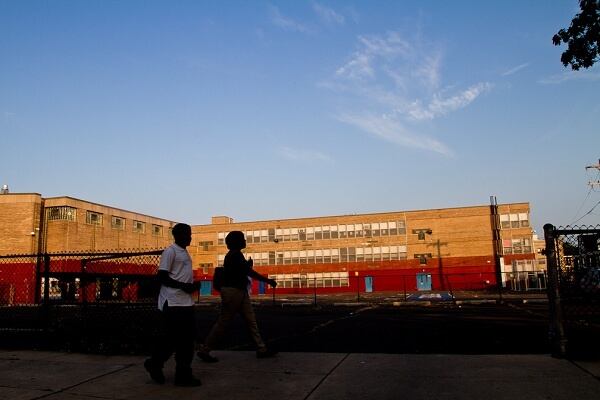Editor’s note: This article was updated to reword material that appeared verbatim in a Philadelphia school district press release.
Parents and teachers have complained for years about crumbling and unsafe Philadelphia school buildings, and have called for greater transparency about problems and repair efforts. Now the district hopes a new website will help address those concerns.
In a move to provide solutions to its facility challenges, the district unveiled a site Tuesday specifically for its Facilities Planning Process aimed to inform the public on how it is managing its aging infrastructure. Visitors will be able to use an interactive map to access information about each school building’s condition, as well as facility assessments conducted by third-party industry professionals.
“Ultimately, what’s going to happen is we’re going to look at this information, along with some other extra experts in the district, and we’re going to come up with a series of options that we think will help solve the unique challenges that the schools are facing,” said Vanessa Benton, deputy chief of school planning and space management for the district.
Concerns about the state of Philadelphia K-12 facilities stem in part from the fact that the average Philadelphia school building is 75 years old.
The district launched the Facilities Planning Process last month to identify the challenges district school buildings are facing and provide recommendations to address them as part of the district’s long-term facilities master plan. The school board approved $1.3 million to fund it.
The district plans to evaluate all school buildings over the next year or so.
“We’re really excited about what the end result will be in around the spring of 2023, so that we will have a comprehensive, holistic plan on how we’re going to change the education landscape across the school district of Philadelphia,” said Reggie McNeil, chief operating officer for the district.
The district is inviting members of the community to participate in discussions from May 10-25, where residents can learn more about the process. To participate, residents can register online.
Funding for capital improvement projects have been in the works for some time.
Superintendent William Hite announced last fall that the district planned to spend some of the district’s roughly $1.1 billion in federal coronavirus relief on building repairs and upgrades. Chief Financial Officer Uri Monson subsequently said $325 million of that federal COVID aid would be spent on facilities improvements. The district plans to spend $2 billion total on improving its aging infrastructure over the next six years.
“Some of our schools were built in the 19th century, and we know that these buildings cannot meet the 21st-century learning needs of our students,” Hite said.
Philadelphia Federation of Teachers President Jerry Jordan, who has been critical of the district in its handling of ventilation and crumbling facilities, said Tuesday that “while we do not have enough details about the plan, any effort to improve transparency and engagement is welcome.”
“Let’s also be very clear: the district must address the facilities crisis through transparency and actual meaningful investments. School closures must not be part of this process,” Jordan added.
Bureau Chief Johann Calhoun covers K-12 schools and early childhood education in Philadelphia. He oversees Chalkbeat Philadelphia’s education coverage. Contact Johann at jcalhoun@chalkbeat.org.






